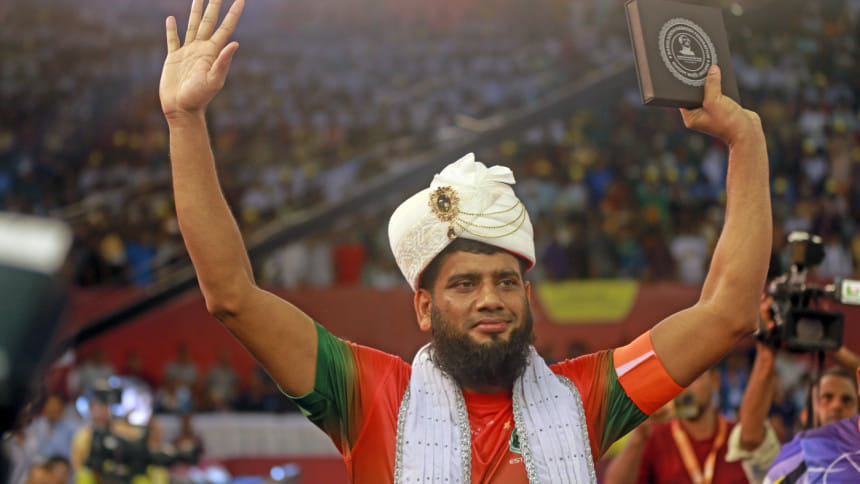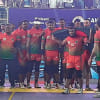‘Bangladesh need a tournament like Pro Kabaddi League’

Country's star kabaddi player Arduzzaman Munshi bid adieu to the game after leading Bangladesh to their fourth title in the Bangabandhu Cup International Kabaddi on June 3 in Dhaka. The Daily Star's Anisur Rahman spoke with the Bangladesh Navy player about the ups and downs of his illustrious career and what steps need to be taken to improve the state of the game in the country. The excerpts are given below:
The Daily Star (DS): You called time on your playing career in grand fashion, winning the final of the Bangabandhu Cup International Kabaddi against Nepal and your teammates then carried you on their shoulders for a victory lap. How did it feel?
Arduzzaman Munshi (AM): I never thought that my retirement would be so grand and memorable. I also did not expect that Bangladesh would win the trophy under my captaincy and I would be the best player of the tournament. It really can't be expressed in words.
Before the tournament, when I decided that I would retire, I did not feel anything special about it. But the emotions became almost unbearable after the final. I had a sleepless night after the final, I was thinking that I will not represent Bangladesh any more. At one point I even started crying. I was restless throughout the night. The next morning, many people phoned me to talk about my retirement and the final but I switched off my mobile phone and tried to get some sleep. I felt really sad after bidding the game goodbye.
DS: You started playing kabaddi professionally in 2007 and made your debut for Bangladesh in 2009. How was the country's kabaddi back then?
AM: To be honest, kabaddi was not in a good position at that time as the performances of the players were not good. There also were shortcomings in organizing. In that period, we started returning home empty-handed from international competitions because we could not take enough preparation and did not have proper training facilities. Kabaddi had to wait for funds from the Bangladesh Olympic Association to start camp ahead of international competitions because the federation was not capable to run the training sessions. The timeframe of the preparation was only two to three months which was not enough. We also did not get to play international warm-up matches.
DS: Bangladesh used to regularly win silver at the SA Games and the Asian Games. But now silver has turned elusive. Why is that?
AM: In my personal opinion, we won silver medal in Asian Games at a time when countries like Iran, Pakistan and others were learning kabaddi from us. They improved their game year by year while we remained stuck and never progressed. We are still behind them in terms of training and facilities. That's why we are not winning medals anymore. Now, there are no weak teams in Kabaddi. Even newcomers Uganda beat Japan in Dhaka this time. It's happening because countries stepping into kabaddi are putting a lot of thought on how to progress. We did not think of improving the country's kabaddi for a long time.
DS: Ha-du-du, a different format of kabaddi, is played all across the country. Still, there are hardly any new talented players in kabaddi. Why?
AM: Former captain Tuhin Tarafder, Fedous, Monirul and I were ha-du-du players before entering kabaddi. There are still a lot of talented ha-du-du players across the country. When I sometimes go to rural places to play ha-du-du, I encourage talented players to take up kabaddi. But they are not able to make that shift because there is no future in kabaddi, no financial benefits. I believe if the federation trains young players and includes them in a pay-scale system or provides them jobs, the interest in kabaddi will grow. Parents will also back their children to take up kabaddi as a profession. Then, Bangladesh can gradually grow in strength and one day beat India and Iran.
DS: You played at the Pro Kabaddi League in India twice. What differences did you notice compared to kabaddi in Bangladesh?
AM: There is a gulf of difference. I would have never learnt about modern kabaddi had I not gone there. Why wouldn't they [Indians] play kabaddi? The players of franchise teams are being guided by physios, trainers, kabaddi coaches and nutritionists. Facilities like modern gym, grounds, training facilities encourages players to train more. But, unfortunately, our coaches can't get the best out of the players because of poor environment. I think it will take five to eight years to create that environment in Bangladesh if we start right now.
I tried my best to utilise my experience from the Indian league when I played for the national team. I think if more players from Bangladesh are allowed to take part in the Pro Kabaddi League, the players will also try to improve their performance to get contracts. This will ultimately help the country's kabaddi. The best players from all countries play in that league. Our players can learn from them, become familiar with their strengths and weaknesses which will help them in international tournaments.
DS: How much can Bangladesh benefit from the Bangabandhu Cup International Kabaddi where strong teams like India, Iran and Pakistan are not competing?
AM: I don't think that the participants in the Bangabandhu Kabaddi were weaker than Bangladesh. We lost to Nepal in 2017, to Thailand in 2016, Japan in 2010, South Korea in 2016 and Sri Lanka in 2016. I think playing at home was the key behind Bangladesh winning the tournament in all four editions. I have seen new players failing to cope with pressure and break down during international matches due to not having any international experience. The benefit of holding this tournament is that the players are gaining experience and learning how to manage different match situations. I think it will help new players put up a strong fight against bigger teams in the Asian Games and SA Games in future.
DS: Do you regret not winning any medals in three Asian Games appearances?
AM: Of course, there is regret. We players always want to win every tournament. In the three Asian Games that I took part in, the teams that won bronze were not far superior to us. We got close, but could not win the medal. I think it did not happen because of some neglect at the organizing level and some wrong technical decisions on the ground.
DS: How can we improve the country's kabaddi?
AM: First of all, the financial benefits for kabaddi players have to be ensured. I think if the federation takes an initiative to hold a franchise tournament like the India's Pro Kabaddi League, then the new generation will be encouraged to take up kabaddi. The franchise teams will invest in training facilities, coaches and players and the players will also try to develop to get contracts. Bangladesh's kabaddi will also progress.
We also must improve the coaches by holding training course or sending them abroad for higher training because kabaddi is changing every minute. I am also interested in coaching and I would love it if the federation gives me the responsibility to train a group of young players by arranging a round-the-year training camp.

 For all latest news, follow The Daily Star's Google News channel.
For all latest news, follow The Daily Star's Google News channel. 







Comments